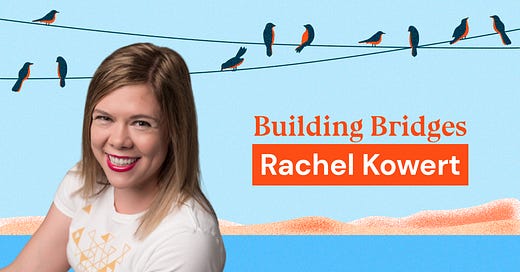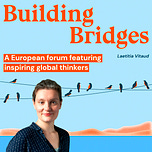For this new episode of the Building Bridges podcast, I’m delighted to interview Dr Rachel Kowert, a research psychologist from Austin, Texas, who’s dedicated her career to studying video games and gamers. Since the beginning of the pandemic, we’ve spent more time playing video games than ever before in the history of video games. But what if it wasn’t a bad thing?
I discovered Rachel’s work in one of my favourite newsletters, Anne Helen Petersen’s Culture Study. That particular edition was titled: "Parents deserve so much more when it comes to the ways video games are discussed in our popular media." A few days before, the New York Times had just published yet another gloomy piece about the dangers of games and parents’ “alarm”.
In a fantastic Twitter thread following the publication of this lazy piece of journalism, Rachel showed that it was “far more moral panic than actual information”. When the wise man points to the moon, the fool looks at the finger, especially if it can generate more clicks and views.
It’s high time we stopped blaming games (and screens) for everything. In her Parent's Guide to Video Games (which I couldn’t recommend enough: it’s the shortest, most effective read on the subject!), she writes:
“First it was the radio. Then it was film, television, rock and roll, and comic books. Today, video games have become the scapegoat of choice for a variety of societal problems, including gun violence, obesity, and addictive behaviours. The fears surrounding the potential negative influence of video games have become more exaggerated and widespread as they have become more popular, more realistic in design, and now, as they are networked online.”
In this interview, Rachel shares fascinating lessons from decades of video games research. What is video games addiction? What’s the link between games and crime? What’s their impact on cognitive development? What about physical and mental health? Do they help us connect better with others or not? In these times of pandemic and social isolation, many gamers see video games are a lifeline. Their experience of games is more relevant than the “moral panic” of clueless video games detractors…
I hope you enjoy listening to this podcast! Do not hesitate to share it with your friends and colleagues, gamers and non gamers alike! 🕹️
For access to the full transcript, there will a paid version of Building Bridges to which you’ll be able to subscribe soon. Stay tuned.
Follow Building Bridges on Twitter! You can listen to all our podcasts on Apple Podcasts and Spotify.
Also Building Bridges is part of a network of Substack newsletters, which you may want to discover: there’s Nicolas Colin’s European Straits, there’s my Laetitia@Work, and our French newsletter, Nouveau Départ.
(Credit: Franz Liszt, Angelus ! Prière Aux Anges Gardiens—extrait du disque Miroirs de Jonas Vitaud, NoMadMusic.)
















Share this post